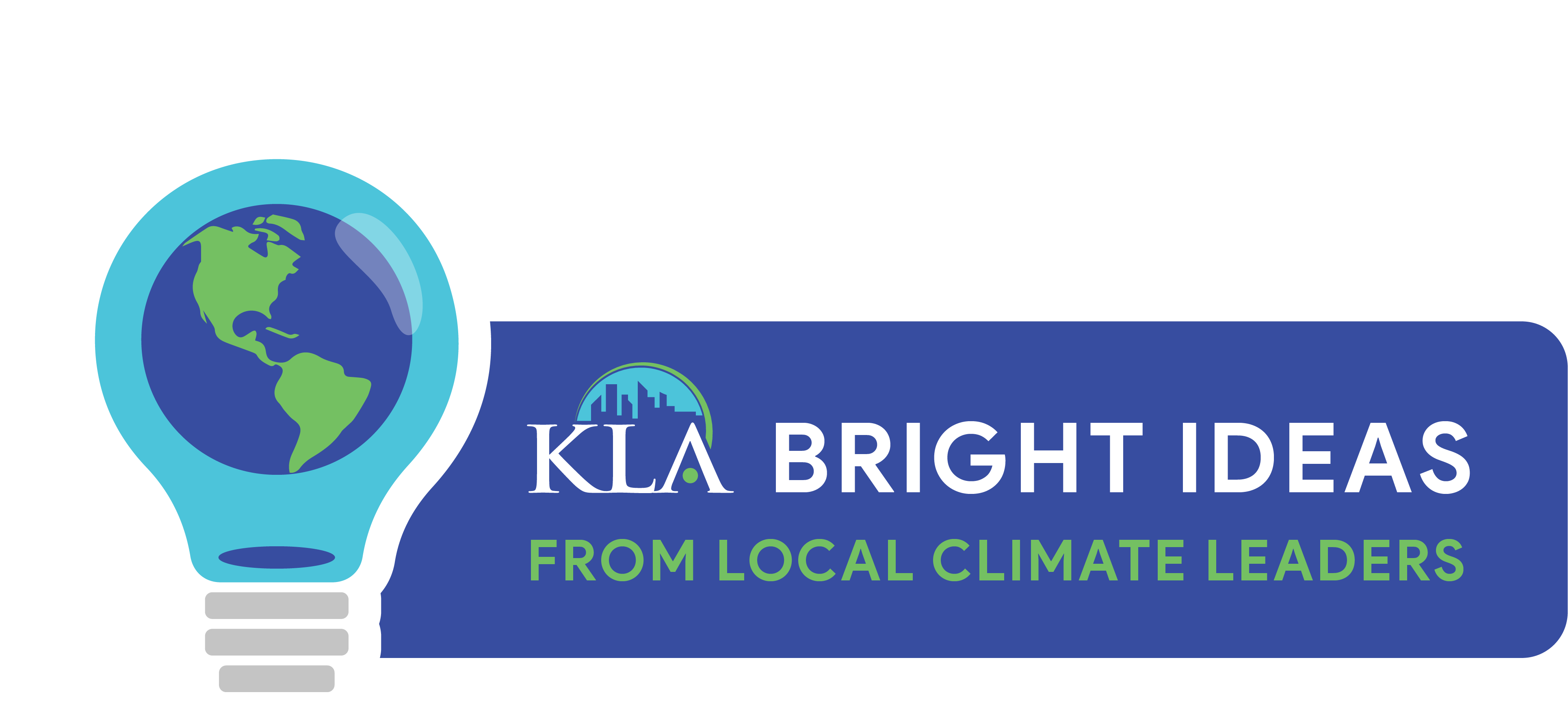KLA clients lead the way with innovative, scalable, replicable climate solutions at the local level.
Each month in 2022 we will shine a spotlight on their bright ideas.

At KLA we’re gearing up for the National Adaptation Forum (NAF) in Baltimore at the end of the month, so we’re using our October Bright Ideas feature – a spot where we normally select a single KLA client project to highlight – to showcase our equity-centered approach to climate resilience work with multiple communities.
Cities, towns and counties seek KLA’s support on all aspects of climate work from mitigation to adaptation, resilience to sustainability. And while there are important distinctions among those, we are quick to note that the climate crisis is here now and requires urgent action. We simply don’t have the luxury of time, so our planning processes incorporate all aspects of addressing climate change. Whether you’re pursuing an electric vehicle fleet to reduce emissions or mapping urban heat islands to better respond to increased heat waves, you’re taking steps to foster a more resilient and sustainable community that can thrive in the short and long term.
We take pride in a process that is data-driven, equity-centered and geared towards swift implementation. Our approach involves knowing the client community – from climate data to community-based organizations; creating partnerships; building climate literacy, including awareness of impacts and vulnerabilities; and creating tools like checklists, business plans and frameworks that build capacity and lead to action.
We’ve long had data on how historically underserved communities – usually lower income, BIPOC (black, indigenous and people of color), older populations and people with disabilities -- are at higher risk of impacts from flooding, drought, wildfire, and extreme heat and storms. An EPA study found that African Americans are 34% more likely to currently live in areas with the highest projected increases in childhood asthma diagnoses and 40% more likely to currently live in areas with the highest projected increases in extreme temperature-related deaths. People with limited mobility or chronic health conditions have more difficulty evacuating during a storm or wildfire. Those with less access to financial resources might not have flood insurance or the ability to get a loan to pay for damages.
And we witness these disparities with each new major climate event. It’s probably not surprising that “nearly a quarter of the people whose deaths are related to Ian were in their 70s, nearly 21% were in their 80s and about 5% were in their 90s.” (source)
Just as the climate impacts in Clark County, NV, are very different than what is projected in New Bedford, MA, the same can be said about how a person of color in a lower income neighborhood in Rochester, NY, will feel the effects of a heat wave versus a white, middle class family across town.
So when it comes to putting equity at the center of community resilience planning, here are some of our clients’ bright ideas that we’ve been proud to support:
New Bedford, MA
The foundation for coastal New Bedford’s climate work is the NB Resilient Climate Action & Resilience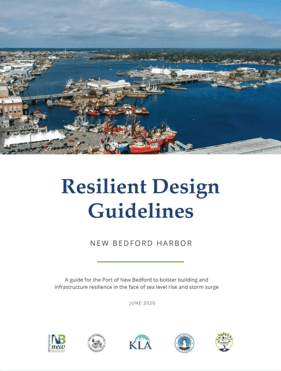 Plan. They engaged community-based organizations as they developed business plans for two resilience hubs at the Dennison Memorial Community Center and the Community Economic Development Center (CEDC). We also worked with them to develop Resilient Design Guidelines and Maritime Business Resilience Toolkit for New Bedford and the neighboring Town of Fairhaven for properties located within the Port of New Bedford to prepare them for the impacts of sea level rise and storm surge.
Plan. They engaged community-based organizations as they developed business plans for two resilience hubs at the Dennison Memorial Community Center and the Community Economic Development Center (CEDC). We also worked with them to develop Resilient Design Guidelines and Maritime Business Resilience Toolkit for New Bedford and the neighboring Town of Fairhaven for properties located within the Port of New Bedford to prepare them for the impacts of sea level rise and storm surge.
Clark County, NV
Clark County (which includes Las Vegas) conducted a Climate Vulnerability Assessment (CVA) to better understand the potential impacts of climate hazards to County operations, community safety and well-being, natural resource health, and business continuity. The assessment included robust quantitative and qualitative analysis of climate trends and projections, as well as projected impacts to public health, sensitive populations, infrastructure, and the regional economy.
The CVA looked at 4 planning subject areas: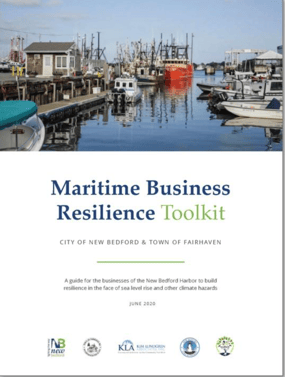
1. Natural systems
2. Infrastructure and facilities
3. People and community
4. Regional economy and transportation
Focused on 4 main climate hazards:
1. Drought
2. Wildfire
3. Flooding
4. Extreme heat
And will include key takeaway fact sheets tailored to 4 key audiences to help understand the technical assessment:
1. Businesses
2. Community organizations
3. Policy makers
4. Residents
North Suffolk, MA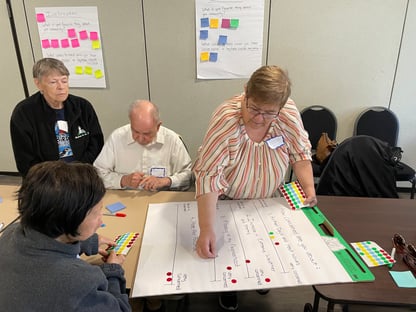
The North Suffolk Office of Resilience and Sustainability’s (NSORS’s) conducted a social vulnerability and equity assessment of the region – Chelsea, Revere and Winthrop – to identify which groups are most at risk from climate hazards, highlight structural barriers to equity, and deepen the understanding of vulnerabilities across the region. A focus group with seniors is pictured here. Those findings were then used to develop a Climate Equity Framework to help NSORS and other municipal departments determine which segments of the population are likely to benefit from or be disparately harmed by a proposed climate resilience or sustainability project or initiative and prioritize projects that will benefit vulnerable sectors of the population and measure equity of projects, initiatives, and policies.
Cambridge, MA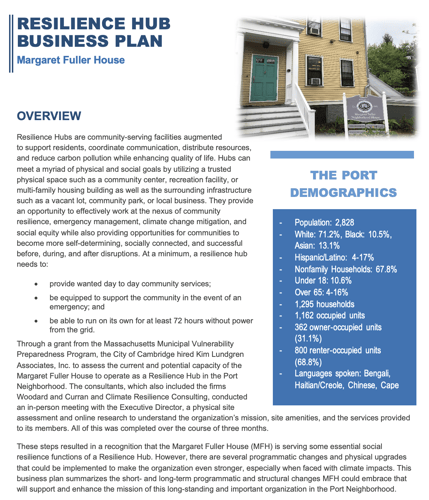
We supported the creation of Cambridge’s first two resilience hubs at the Margaret Fuller House and Cambridge Community Center. This included collaborating with two community-based organizations to develop business plans which has led to at least one of the centers receiving grant funding to implement the plan.
Rochester, NY
With the support of a consultant team led by KLA, Rochester has been working on its first Extreme Heat Plan which identifies populations most vulnerable to heat and has detailed plans for how to educate and support them to prevent heat-related illness and death.
Medford, MA
We worked with the City of Medford Board of Public Health to identify priority service areas and spaces for a pilot resilience hub based on where, what and how:
• Where: Existing resources, neighborhood sensitivity to climate change, and neighborhood adaptive capacity
• What: Listen to community concerns about community resilience and highlight the resilient programming and services that are important to community members, with the intention of amplifying the voices of residents facing social inequities and injustices
• How: What spaces can accommodate important resilient programming and services and share the requirements of a Resilience Hub site with recommendations for local organizations and local government on next steps.
The framework we developed was built into a Resilience Hubs Site Checklist -- a part of which is included below -- to be utilized by community-based organizations or the City.
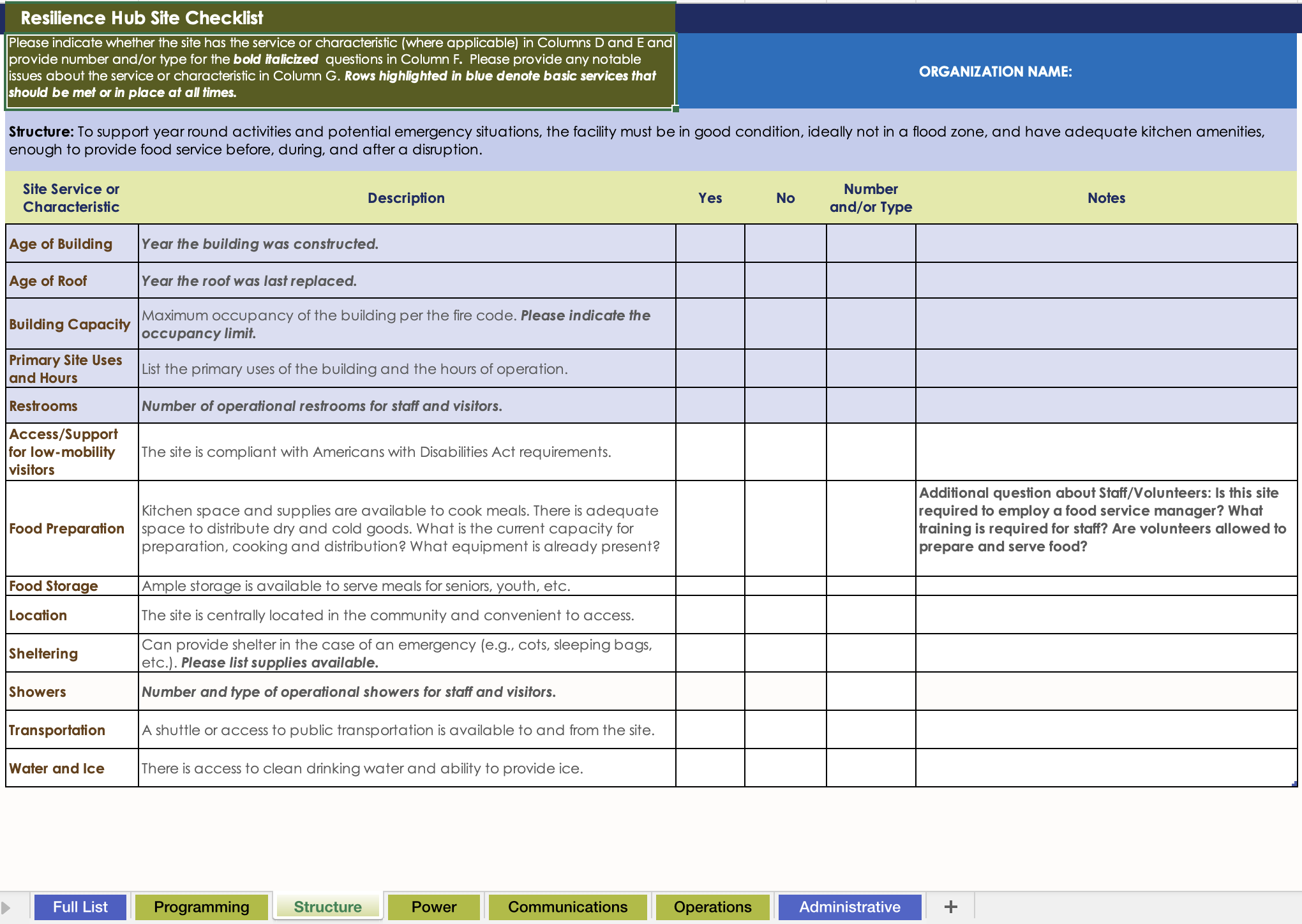
This is just the tip of the [rapidly melting] iceberg when it comes to bright ideas on local, equitable climate resilience. If you’re going to NAF, be sure to come visit us in the Exhibit Hall where we’re sharing a booth with Climate Resilience Consulting and speaking at sessions where we’ll offer a deeper dive into our resilient and overall climate action approach and our work with these and other clients.
February 2022: San Antonio Employee Climate Training Program
March 2022: Concord, MA, Heat Pump Coaches
April 2022: Encinitas, CA, Building Electrification Ordinance
May 2022: New Bedford, MA, Resilient, Equitable Green Infrastructure
June 2022: Devens, MA, Circular Economy Waste Reuse Hub
July 2022: Clark County, NV, Data Driven Equitable Engagement
September 2022: Columbia, MO, Heat Mapping


